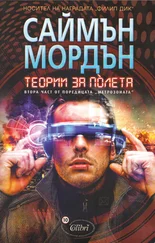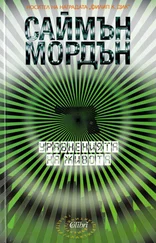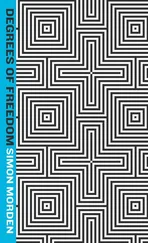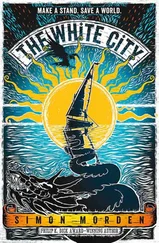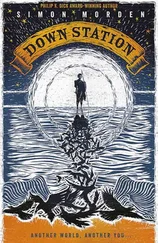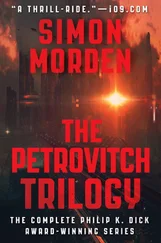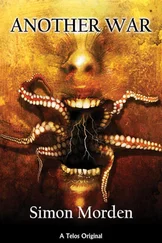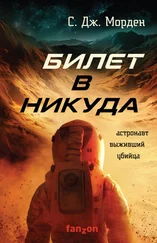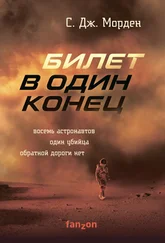The overhead power lines, supported by spidery metal gantries, were humming.
“I thought you said nothing was working?” She stared up the empty line. It passed under two bridges before disappearing into a tunnel.
“I think I said we weren’t in control of anything; a world of difference.”
“We need to go that way.” She pointed down the track, away from the station. “If there’s anything you want to tell me, now’s a good time.”
Out of sight, a steel wheel screeched. The ringing, whistling noise echoed around them. Petrovitch licked his dry lips and remembered the cars. “Have you got another plan?”
“It’s not as good.” She turned to see a train, lights as bright as stars, wink into existence. The slanted face of the power unit grew, framed by the road bridge it had to pass under. “Is this something to be afraid of?”
“Yeah.” He started edging back toward the wire fence.
Her hand curled around his arm. “Wait. We don’t know which way to run.”
The train was closing fast; too fast for an urban line, too fast for the buffers up ahead, too fast even for the gentle curve it was attempting to take. The first carriage was tilting farther and farther out, and taking the two behind with it. The tortured wail of grinding metal became a roar.
Petrovitch really, really wanted to be anywhere but in front of this beast, and still she hung onto him, forcing him to stay still.
Wheels left the track, great metal and glass containers were in flight, spreading out like a thrown chain.
At last. Madeleine picked him up and in three strides she was at the platform’s cliff face. She unceremoniously posted him on top and lifted herself on after him. She was on her feet before he was. She took his hand and they sprinted across the platform, down into the next rail bed. There, she wrapped him up in her.
The ground shook itself like a wet dog. The first carriage, almost vertical, tried to carve a new route through the brick and steel bridge. It bent and broke like a straw, one half soaring into the sky, the other digging itself into the ground. The next car hit a support head-on, ripping a flash of lightning out of the expanding cloud of dust.
The last one leaped over the remains of the bridge, intact, spinning. Before it crashed back down, the front end of the train howled past, into the station, and didn’t stop when it reached the end of the line.
The noise was a punch to the gut, a concussion hard enough to break stone. Metal groaned, masonry toppled.
Then came the carriage. It had turned sideways, and it hit the end of the platforms rolling. Glass crystals sprayed out, and the jagged-edged windows spat out the contents of the train while grinding flat everything before it.
It passed over their heads, a blurred, scouring shadow above which disappeared into the darkness, dragging roof supports down with it. Something heavy shifted in a long, slow slide inside the station concourse which grew in volume, then subsided. A storm-front of dust and grit blew out, smothering them. A final patter of debris, and it was over.
Petrovitch had his face next to hers, in the dirty darkness formed by the angle of their cowering bodies.
“You okay?” He could feel her eyelashes tickle his cheek, her ragged breath against his skin.
“Do you suppose there was anyone on that train?”
He risked raising his head. His glasses were coated with a layer of speckled dust. He took them off and huffed gently on each of the lenses. Even that simple act made him cough hoarsely.
The out-of-focus scene resolved as he put them back on.
“ Yobany stos, ” he said.
The station behind him had partially collapsed, the bridge in front torn in two, and the two platforms stripped clean and carved with deep grooves. The air was thick with fine powder that the wind tugged at like fog.
The fence they’d crawled under was gone, along with the front wall of the terrace opposite, which was ripped out and thrown down across the road. The rooms inside looked like the insides of dolls houses: a standard lamp flickered as it hung by its flex from a first-story sitting room. Part of the first carriage was embedded in someone’s front room.
“We have to look for survivors,” said Madeleine.
“No. No, we don’t.” Petrovitch gingerly brushed his hair with his fingertips. It was stiff with dust, and there were fragments of glass lodged near the roots. “What possible use could we be?”
“We could help them,” she said, her voice trailing away as she realized the enormity of the disaster.
“We can’t even phone for an ambulance! The network is down, and even if it wasn’t, we don’t have a phone—I saw you look at yours when you took off your robes, then you handed it over anyway. But who would we call? Who would come? The police have vanished. The hospitals will be locked down. The fire service? Where would they start? The whole yebani city is in flames.”
“We’re not just walking away.” She balled her fists with frustration.
“I was thinking of running,” said Petrovitch, and pointed toward the tower blocks of Paradise. “That looks like a good direction.”
“I can save someone!”
He could feel himself losing his temper, a heat that was rising to boiling point inside. “And I can save everyone. If we stay here, all we can do is drag bodies out of the wreckage and watch the wounded die for the lack of anything more complicated than an aspirin. There’s no one else coming. No one. It’s just us. So what do we do? We can waste our time being good and holy and accomplish absolutely nothing. Or we can go and find Sonja Oshicora and take her to the New Machine Jihad, who might be persuaded to stop this bloody slaughter. It’s a long shot, it makes no sense, but you know, it might just work. Your call.”
Madeleine swayed, shifting her weight from foot to foot. “You care, don’t you?”
“Too much. The Metrozone took me in, hid me, gave me a life. I owe it.”
She hawked up some phlegm, and spat on the ground. She smacked her lips like there was a bad taste in her mouth. “I suppose we’ll have to do it your way.”
“This isn’t cowardice, even though I’ve seen enough carnage for one morning. This is the only thing I can think of.” He dug his hands in his pockets to feel the reassuring touch of a gun. “I know this makes you feel like govno: it won’t exactly go down in history as my finest hour, either.”
Madeleine groaned, and chased some loose strands of hair away. With one last look behind her, she set a reluctant foot forward. The other followed more easily. Petrovitch half-jogged, half-walked beside her giantess strides. Their path was blocked by the demolished bridge, and they could do nothing else but start to climb over the unstable rubble.
It shifted and slid. A car roof showed green through the dust and boomed as they stepped on it. As they crested the edge of the crazily tilted box-girder roadway, the back end of a railway carriage came into view. All its glass was gone, and anything loose inside had been propelled to the front.
Madeleine glanced at it briefly, then pointedly turned away and concentrated her gaze on where she was placing her feet.
Petrovitch did more. He waited for her to pull ahead, then picked his way to the first visible window. As he approached, he became more and more relieved: the carriage was empty. It was nothing more than a ghost train. He put his head inside to check. No bodies, no blood. No repeat of the lifts inside the Oshicora Tower.
He caught her up and they walked side by side, past the end of the platform and into the long sloping cut that led into the tunnel’s entrance.
“There was no one there,” he said quietly.
Читать дальше
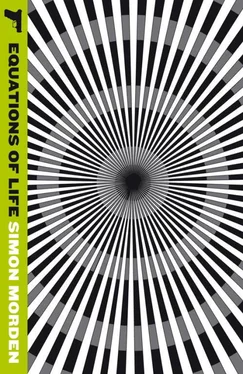
![Саймон Морден - Билет в никуда [litres]](/books/388091/sajmon-morden-bilet-v-nikuda-litres-thumb.webp)
![Саймон Морден - Билет в один конец [litres]](/books/395533/sajmon-morden-bilet-v-odin-konec-litres-thumb.webp)

